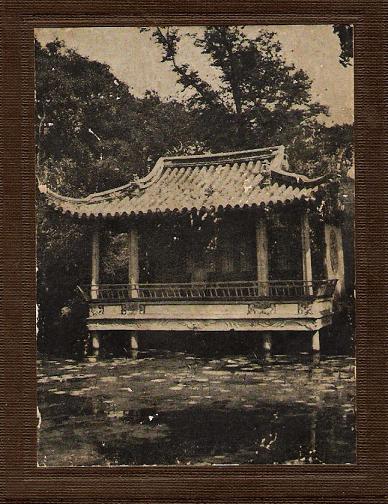My Lady of the Chinese Courtyard by Elizabeth Cooper.
***Etext Dedicated to Marion by "Teary Eyes" Anderson.***
Transcriber's Note:
***I try to edit my etexts so they can easily be used with voice
speech programs, I believe blind people, and children should also
be able to enjoy the many books now available electronically. I
use the -- for a em-dash, with a space, either before or after
it depending on it's usage. This helps to keep certain programs
from squishing the words together, such as down-stairs. Also to
help voice speech programs I've enclosed upper case text
between - and _ (-UPPER CASE TEXT_). This etext was made with a
"Top can" text scanner, with a bit of correcting here and there.***

My Lady of the Chinese Courtyard by Elizabeth Cooper.
Author of "Sayonara," etc.
-With Thirty-One Illustrations In Duotone From Photographs_.
-To My Husband_.
"What I do
And what I dream include thee, as the wine
Must taste of its own grapes"
-Elizabeth Barrett Browning_
-Author's Note_.
In these letters I have drawn quite freely and sometimes literally from
the excellent and authoritative translations of Chinese classics by
Professor Giles in his "Chinese Literature" and from "The Lute of
Jude" and "The Mastersingers of Japan," two books in the "Wisdom of
the East" series edited by L. Cranmer-Byng and S. A. Kapadia (E. P.
Dutton and Company). These translators have loved the songs of the
ancient poets of China and Japan and caught with sympathetic
appreciation, in their translations, the spirit of the East.
I wish to thank them for their help in making it possible to render into
English the imagery and poetry used by "My Lady of the Chinese
Courtyard."
Acknowledgment is also made to Mr. Donald Mennie of Shanghai,
China, who took most of the photographs from which the illustrations
have been made.
-Elizabeth Cooper_.
-Part 1_.
-Preface_.
A writer on things Chinese was asked why one found so little writing
upon the subject of the women of China. He stopped, looked puzzled
for a moment, then said, "The woman of China! One never hears about
them. I believe no one ever thinks about them, except perhaps that
they are the mothers of the Chinese men!"
Such is the usual attitude taken in regard to the woman of the flowery
Republic. She is practically unknown, she hides herself behind her
husband and her sons, yet, because of that filial piety, that almost
religious veneration in which all men of Eastern races hold their
parents, she really exerts an untold influence upon the deeds of the
men of her race.
Less is known about Chinese women than about any other women of
Oriental lands. Their home life is a sealed book to the average person
visiting China. Books about China deal mainly with the lower-class
Chinese, as it is chiefly with that class that the average visitor or
missionary
***Etext Dedicated to Marion by "Teary Eyes" Anderson.***
Transcriber's Note:
***I try to edit my etexts so they can easily be used with voice
speech programs, I believe blind people, and children should also
be able to enjoy the many books now available electronically. I
use the -- for a em-dash, with a space, either before or after
it depending on it's usage. This helps to keep certain programs
from squishing the words together, such as down-stairs. Also to
help voice speech programs I've enclosed upper case text
between - and _ (-UPPER CASE TEXT_). This etext was made with a
"Top can" text scanner, with a bit of correcting here and there.***

My Lady of the Chinese Courtyard by Elizabeth Cooper.
Author of "Sayonara," etc.
-With Thirty-One Illustrations In Duotone From Photographs_.
-To My Husband_.
"What I do
And what I dream include thee, as the wine
Must taste of its own grapes"
-Elizabeth Barrett Browning_
-Author's Note_.
In these letters I have drawn quite freely and sometimes literally from
the excellent and authoritative translations of Chinese classics by
Professor Giles in his "Chinese Literature" and from "The Lute of
Jude" and "The Mastersingers of Japan," two books in the "Wisdom of
the East" series edited by L. Cranmer-Byng and S. A. Kapadia (E. P.
Dutton and Company). These translators have loved the songs of the
ancient poets of China and Japan and caught with sympathetic
appreciation, in their translations, the spirit of the East.
I wish to thank them for their help in making it possible to render into
English the imagery and poetry used by "My Lady of the Chinese
Courtyard."
Acknowledgment is also made to Mr. Donald Mennie of Shanghai,
China, who took most of the photographs from which the illustrations
have been made.
-Elizabeth Cooper_.
-Part 1_.
-Preface_.
A writer on things Chinese was asked why one found so little writing
upon the subject of the women of China. He stopped, looked puzzled
for a moment, then said, "The woman of China! One never hears about
them. I believe no one ever thinks about them, except perhaps that
they are the mothers of the Chinese men!"
Such is the usual attitude taken in regard to the woman of the flowery
Republic. She is practically unknown, she hides herself behind her
husband and her sons, yet, because of that filial piety, that almost
religious veneration in which all men of Eastern races hold their
parents, she really exerts an untold influence upon the deeds of the
men of her race.
Less is known about Chinese women than about any other women of
Oriental lands. Their home life is a sealed book to the average person
visiting China. Books about China deal mainly with the lower-class
Chinese, as it is chiefly with that class that the average visitor or
missionary
...